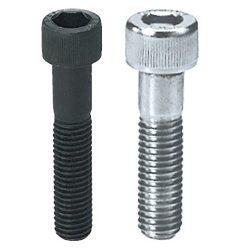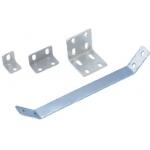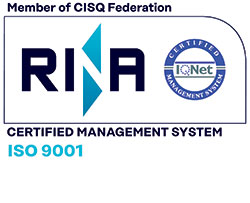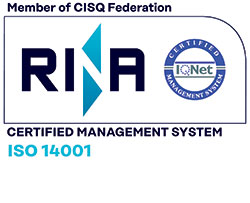Angle brackets / unmachined, through-hole, parallel pin bore / cast iron / treatment selectable (Part Numbers - CAD Download)
- Promotional pricing
- Volume Discount
Part Number
Once your search is narrowed to one product,
the corresponding part number is displayed here.
- Drawing / Specifications
- 3D Preview 3D preview is available after complete configuration
- Part Numbers
- More Information
- Catalog
Back to the Category Angle Brackets
Technical Drawing - Angle Brackets
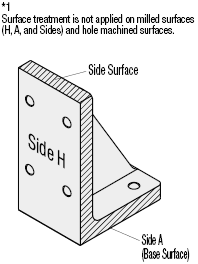
Open the technical drawing in the new window
Available dimensions and tolerances can be found under the tab More information.
Basic Properties (e.g., material, hardness, coating, tolerance) - Angle Brackets
| Type | Hole Machining Selection | Material | Surface Treatment |
| IK | FB (No Hole) D (Through Hole Diameter Fixed Type) DM (Through Hole Diameter Selectable Type) K (Through Hole and Dowel Hole Diameter Fixed Type) KM (Through Hole and Dowel Hole Diameter Selectable Type) | EN-JL 1040 Equiv. | Primer Paint (Gray) |
| BIK | Black Oxide | ||
| MIK | Electroless Nickel Plating |
*1 Surface treatment is not applied to the machined surfaces and holes.
Further specifications can be found under the tab More information.
Composition of a Product Code - Angle Brackets
| Part Number | - | A | - | N | - | D |
| IKFB350 IKDM100 BIKKM200 | - - - | 150 100 120 | - - | N10 N12 | - | D8 |
Part Number:
- In order to open the 3D preview, the part number must be fixed.
3D preview is not available, because the part number has not yet been determined.
Part Number
|
|---|
| MIKD150-70 |
| MIKDM150-70-N[10,12,14] |
| Part Number |
Standard Unit Price
| Minimum order quantity | Volume Discount | RoHS | Hole Machining | Surface Treatment | Height H (mm) | Dimension A (mm) | D (mm) | N (mm) | |
|---|---|---|---|---|---|---|---|---|---|---|---|
68.04 € | 1 | Available | 7 Days | 10 | Through Hole | Electroless Nickel Plating | 150 | 70 | - | - | |
- | 1 | 9 Days | 10 | Through Hole | Electroless Nickel Plating | 150 | 70 | - | 10 ~ 14 |
Loading...
Back to the Category Angle Brackets
Technical Drawing - Angle Brackets

Open the technical drawing in the new window
Specifications Tables - Angle Brackets
| Part Number | A | Angle Plate Body | Unit Price | |||||
| No Hole | ||||||||
| Type | H | W | T | T1 | IKFB | BIKFB | MIKFB | |
No Hole IKFB BIKFB MIKFB | 60 | 40 | 30 | 8 | 6 | |||
| 100 | 40 | 30 | 8 | 6 | ||||
| 50S | 50 | 15 | 8 | |||||
| 50 | 100 | 14 | ||||||
| 100 | ||||||||
| 150 | 50 | 50 | 15 | 8 | ||||
| 70 | 100 | 14 | ||||||
| 75 | 75 | |||||||
| 100 | 100 | |||||||
| 200 | 75 | 75 | 15 | 14 | ||||
| 120 | 100 | |||||||
| 250 | 120 | 100 | 18 | 15 | ||||
| 300 | 150 | |||||||
| 350 | 150 | |||||||
| 400 | 150 | |||||||
| Part Number | A | Angle Plate Body | Through Hole | Unit Price | |||||||||||||
| Through Hole Diameter Fixed | Through Hole Diameter Selectable | ||||||||||||||||
| Type | H | W | T | T1 | N | N (Selection) | B | X | F | Y | G | IKD | BIKD | MIKD | IKDM | MIKDM | |
| Through Holes (Through Hole Diameter Fixed) IKD BIKD MIKD (Through Hole Diameter Selectable) *2 IKDM MIKDM | 60 | 40 | 30 | 8 | 6 | 3.5 | - | 20 | 15 | 15 | 30 | 20 | - | - | |||
| 100 | 40 | 30 | 8 | 6 | 3.5 | - | 20 | 15 | 15 | 55 | 30 | - | - | ||||
| 50S | 50 | 15 | 8 | 9 | 10 12 14 | 30 | 35 | - | |||||||||
| 50 | 100 | 14 | 11 | 70 | 45 | 40 | |||||||||||
| 100 | 45 | 40 | |||||||||||||||
| 150 | 50 | 50 | 15 | 8 | 9 | 30 | 35 | - | 75 | 60 | |||||||
| 70 | 100 | 14 | 11 | 70 | 40 | ||||||||||||
| 75 | 75 | 50 | |||||||||||||||
| 100 | 100 | 70 | 45 | 40 | |||||||||||||
| 200 | 75 | 75 | 15 | 14 | 11 | 50 | 40 | - | 110 | 70 | |||||||
| 120 | 100 | 70 | 50 | 50 | |||||||||||||
| 250 | 120 | 100 | 18 | 15 | 11 | 70 | 50 | 50 | 140 | 90 | |||||||
| 300 | 150 | 40 | 90 | 190 | |||||||||||||
| 350 | 150 | 230 | 100 | ||||||||||||||
| 400 | 150 | 260 | 120 | ||||||||||||||
Portions without specific dimensions are same as FB (No Hole Type).
| Part Number | A | Angle Plate Body | Through Hole | Dowel Hole | Unit Price | ||||||||||||||||
| Through Hole and Dowel Hole Diameter Fixed | Through Hole Diameter Selectable | ||||||||||||||||||||
| Type | H | W | T | T1 | N | N (Selection) | B | X | F | Y | G | DH7 | DH7 (Selection) | a | h | IKK | BIKK | MIKK | IKKM | BIKKM | |
| Through Holes and Dowel Holes (Through Hole and Dowel Hole Diameter Fixed) IKK BIKK MIKK (Through Hole and Dowel Hole Diameter Selectable) *3 IKKM BIKKM | 60 | 40 | 30 | 8 | 6 | 3.5 | - | 20 | 15 | 15 | 30 | 20 | 3 | - | - | 40 | - | - | |||
| 100 | 40 | 30 | 8 | 6 | 3.5 | - | 20 | 15 | 15 | 55 | 30 | 3 | - | - | 70 | - | - | ||||
| 50S | 50 | 15 | 8 | 9 | 10 12 14 | 30 | 35 | - | 6 | 6 8 10 | |||||||||||
| 50 | 100 | 14 | 11 | 70 | 45 | 40 | 10 | 65 | |||||||||||||
| 100 | 45 | 40 | 65 | ||||||||||||||||||
| 150 | 50 | 50 | 15 | 8 | 9 | 30 | 35 | - | 75 | 60 | 6 | - | 105 | ||||||||
| 70 | 100 | 14 | 11 | 70 | 40 | 10 | 55 | ||||||||||||||
| 75 | 75 | 50 | |||||||||||||||||||
| 100 | 100 | 70 | 45 | 40 | 65 | ||||||||||||||||
| 200 | 75 | 75 | 15 | 14 | 11 | 50 | 40 | - | 110 | 70 | 10 | 55 | 145 | ||||||||
| 120 | 100 | 70 | 50 | 50 | 75 | ||||||||||||||||
| 250 | 120 | 100 | 18 | 15 | 11 | 70 | 50 | 50 | 140 | 90 | 10 | 75 | 185 | ||||||||
| 300 | 150 | 40 | 90 | 190 | 85 | 235 | |||||||||||||||
| 350 | 150 | 230 | 100 | 280 | |||||||||||||||||
| 400 | 150 | 260 | 120 | 320 | |||||||||||||||||
*4 When A=40, Dowel Hole is not provided on Base Surfaces (Side A).
Portions without specific dimensions are same as FB (No Hole Type).
General Information - Angle Brackets

Angle Bracket Selection Details
- Material: aluminum, steel, cast steel, stainless steel
- Coatings: untreated, burnished, primed (grey), nickel-plated
- Design: cast, welded
- Perpendicularity: up to 0.02/100
- Bore holes: without bore hole, through-hole, internal thread, dowel pin bore, oblong hole
- Dowel pin bore: H7
- Length A: 40 to 150 mm
- Length H: 50 to 500 mm
- Width: 30 to 100 mm
Description/Basics
Basically, an angle bracket is used for precise and solid fastening or connecting of different components and as frame constructions in mechanical and plant engineering. In most cases, angle brackets are uneven.
Due to its high perpendicularity, an angle bracket is among the precise mounting angles. Thanks to their stiffening rib, the angle bracket is also more solid and stiffer than conventional mounting angles and offers a precise, robust and secure connection.
MISUMI offers angle brackets with configurable through holes and dowel pin bores. The through hole can be converted to a tapped hole using the [MC] option. In addition, with the help of the option [LN, HN], the through hole of the angle brackets can be changed to an elongated hole. The angle bracket itself or the element to be fastened can thus be adjusted. The optional dowel pin holes in conjunction with dowel pins offer the possibility of aligning and mounting components such as manual stages, cylinders or other devices as accurately as possible on an angle bracket.
Our angle brackets are also available as blanks without mounting holes for individual machining.
Due to the many variations of an angle bracket, it offers design flexibility. This allows adapting it to the machine environment. With MISUMI, you can configure and have your steel brackets customized or stainless steel angles customized.
Angle brackets are often used as cylinder holders for air cylinders, as the exact straightness and exact position of the dowel pin bores allow for exact positioning of the cylinders. An angle console is also suitable for holding and holding positioning stages. Occasionally, the angle bracket is also used in clamping technology to accommodate the push-pull toggle clamps, clamp cylinder or gripper.
MISUMI offers for assembly different threaded rods and nuts, as well as washers.
Steel angle bracket/steel bracket
The benefits an angle bracket made of steel (cast steel) provides are primarily its high strength and the load capacity of the base material. As a result, steel angle brackets can absorb high loads.
Since steel has good quality, it is less expensive to manufacture, easy to rework and welds well. Compared to many other metallic raw materials, steel is quite cost-effective and can therefore be found in many applications.
Thanks to its good thermal conductivity, a steel angle or steel angle bracket can be used in areas with high temperatures. Since steel tends to oxidize, a coating should be provided as much as possible depending on the angle bracket. For this purpose, you can choose between either burnished, nickel-plated or primed.
Stainless steel angle bracket/stainless steel bracket
Angle brackets made of steel or stainless steel are characterized by their high durability. Thanks to their resistance, stainless steel angle brackets are very robust and stable. They are less prone to corrosion because the chrome content forms a passive layer (oxide film). Especially in corrosive environments, it is possible to use an angle bracket made of stainless steel (stainless steel), since the base material is very high-quality. Stainless steel also has high temperature resistance and can be welded. However, at higher temperatures, or even when welding the material, discoloration can occur (tempering colour). The stainless steel angles are also hygienic due to the material and are often used in medical technology.
Aluminum angle bracket/aluminum bracket
An important advantage of aluminum angle brackets is their reduced weight compared to steel or stainless steel angle brackets. This special feature can contribute to weight reduction in many applications. With regard to the low weight, the aluminum angle brackets have by comparison a high strength and can withstand high loads.
In addition, the simple processing and post-processing of the material makes the aluminum angle consoles cost-efficient. Similar to stainless steel, aluminum forms an oxide film and is thus well protected against corrosion. Another advantage of the angle bracket made of aluminum is that the base material has a low thermal expansion. This allows these angle consoles to be used in applications that are subject to frequent temperature changes. Angle consoles made of aluminum also have good electrical conductivity and can thus dissipate electrical voltages such as electrical static charges. This is often necessary in electrical systems or in the electronics industry for the production of electronic components.
Application Examples - Angle Brackets
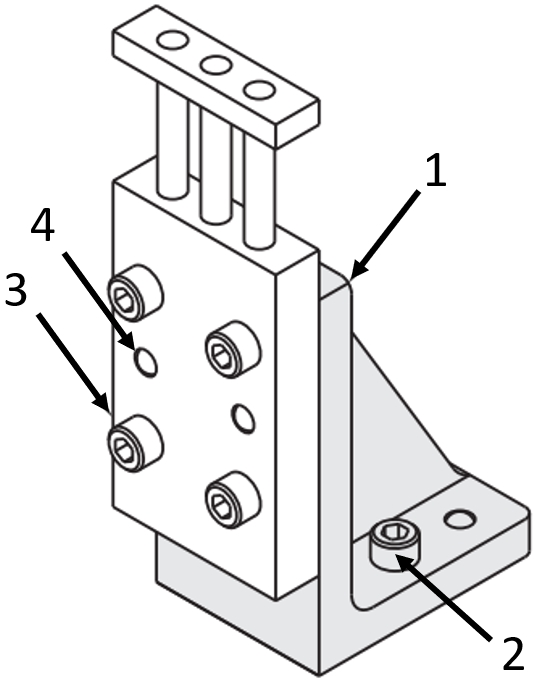
Application example: angle bracket with guide cylinder
(1) Angle bracket, (2) Hexagon socket screw, (3) Air cylinder, (4) Dowel pin
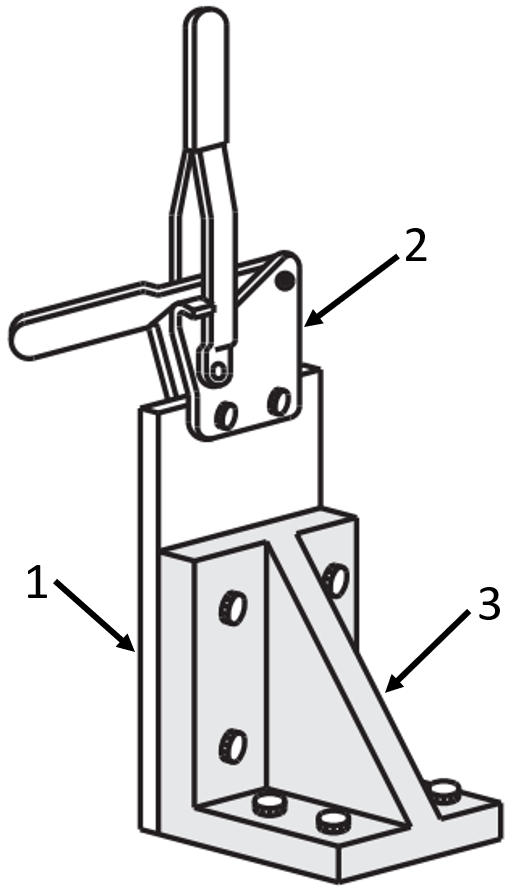
Application example: angle bracket with push-pull toggle clamps
(1) Mounting plate, (2) push-pull toggle clamps, (3) angle bracket
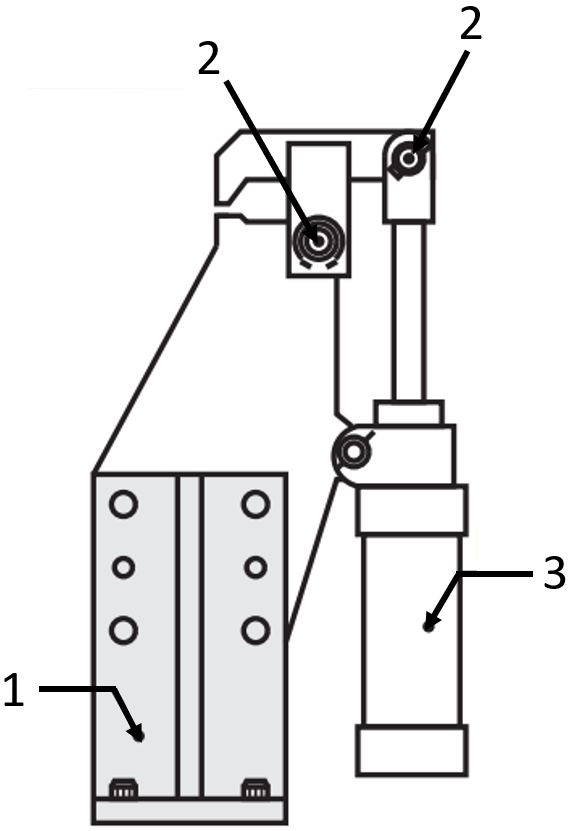
Application example: angle bracket with cylinder
(1) Angle bracket, (2) hinge bolts, (3) cylinder
Industrial Applications
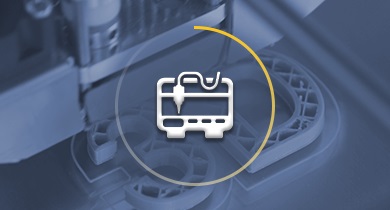


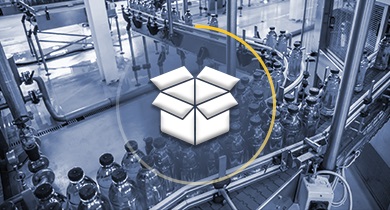
Basic information
| Material | Steel | Strength | Standard (Cast) |
|---|
Configure
Basic Attributes
-
D(mm)
-
N(mm)
-
Type
- BIKD
- BIKFB
- BIKK
- BIKKM
- IKD
- IKDM
- IKFB
- IKK
- IKKM
- MIKD
- MIKDM
- MIKFB
- MIKK
-
Hole Machining
- Through Hole
- Through Holes and Dowel Holes
- No Hole
-
Surface Treatment
- Electroless Nickel Plating
- Black Oxide
- Primer Paint (Gray)
-
Height H(mm)
-
Dimension A(mm)
-
Filter by CAD data type
- 2D
- 3D
Filter by standard shipping days
-
- All
- Same day
- 5 Days or Less
- 7 Days or Less
- 9 Days or Less
Optional Attributes
- The specifications and dimensions of some parts may not be fully covered. For exact details, refer to manufacturer catalogs .
Frequently Asked Questions (FAQ)
-
Question:
What do you use the angle brackets for?
-
Answer:
An angle bracket can be used for a wide variety of applications in mechanical engineering. In general, they are used to connect or fix different components and devices. Angle brackets are manufactured very precisely with their perpendicularity compared to conventional mounting angles. Therefore, angle brackets are also frequently used to accommodate pneumatic cylinders, positioning stages, and stages. Another benefit of the angle bracket is its high rigidity due to the additional stiffening rib. This provides the angle bracket with a very good stability. Therefore, it can absorb heavier loads compared to normal angles.
-
Question:
What are the different types of steel on angle brackets?
-
Answer:
MISUMI offers the massive and precise angle bracket in two different types of steel. The MISUMI product range offers the material EN 1.0038 equivalent, which is also known as S235JR. This material is often used for extruded profiles. This shows good ductility, toughness and plasticity. As a further material, the range contains the EN-JL 1040 equivalent. This is grey cast iron with slat graphite, which has very good workability and is often used in machine tools.
-
Question:
What coatings are available for angle brackets made of steel?
-
Answer:
Our angle brackets are available untreated for further processing. To protect against corrosion, the angle bracket can be burnished, primed (grey) and nickel-plated.
-
Question:
What are the advantages of aluminum brackets?
-
Answer:
Aluminum brackets and aluminum angle brackets have a low weight and are therefore suitable for weight reduction. Aluminum, on the other hand, has a high strength in relation to heavier materials. As a result, these are also suitable for high loads. Another advantage is that aluminum does not require further corrosion protection. In addition, aluminum has a low thermal expansion, which gives it dimensional stability in case of temperature fluctuations.
Complementary Products
Tech Support
- Technical Support
- Tel:+49 69 668173-0 / FAX:+49 69 668173-360
- Technical Inquiry
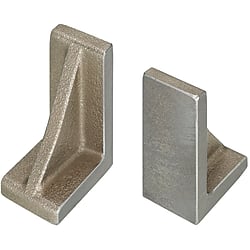



![[Precision] X-Axis / Cross Roller](http://content.misumi-ec.com/image/upload/f_auto,t_product_recommend_a/v1/p/jp/product/series/110300196460/110300196460_001.jpg)
